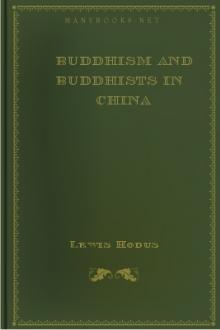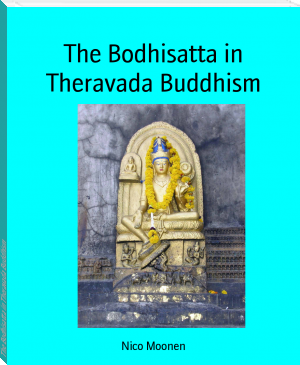Buddhism and Buddhists in China - Lewis Hodous (top ten books of all time txt) 📗

- Author: Lewis Hodous
- Performer: -
Book online «Buddhism and Buddhists in China - Lewis Hodous (top ten books of all time txt) 📗». Author Lewis Hodous
This knowledge should be interpenetrated by a genuine sympathy, that is, imagination tinged with emotion. The worker should be able to view doctrines, values and actions from the point of view of the Buddhist and his past history. He must have a genuine interest in and a great capacity for friendship. The Buddhists are very human, responding to friendship very quickly. Such friendship forms a link between the man and the larger friendship of Christ.
3. Emphasis on the Aesthetic in ChristianityA Chinese Christian leader described his idea of a church as a place removed from the din of the street, approached by a walk flanked with trees and flowers and adorned within by symbols speaking to the heart of the Chinese. He longed for the mystic silence and the beauty of holiness which would open the windows of the world of spiritual reality and throw its light upon the problems of life. He was asked, “Would you adapt some of the symbols of the Chinese religions?” He said, “Many of those symbols are neutral. They suggest religious emotion. Their character depends upon the content which the occasion puts into them. If the content is Christian then the symbols and emotions will become Christian.”
Christianity is a religion of beauty. The beautiful in architecture, symbol and ritual, expressing the spiritual universe of the past, present and future, makes a strong appeal to the Chinese heart. It may well be emphasized in the future as never before.
4. Emphasis on the Mystical in ChristianityNot long ago a Buddhist in one of the large cities of China was converted. He found great joy in the experience which revived him and gathered into unity the broken fragments of his life. He attended church regularly and participated in the prayer meetings. Gradually he discovered that he was not being nourished. He felt his joy slipping away from him and his divided life reinstating itself. He went to Buddhism for consolation. He is not hostile to the church. He appreciates the help he received, but he said that he came for consolation and peace and found the same—hard orthodoxy and morality so familiar to him in Confucianism.
While the case of this man may have individual peculiarities, it may be made the starting point for a discussion of the situation in many churches in China. The early message to the Chinese was doctrinal. The false notion of many gods had to be displaced by the idea of the one true God. With this idea of the true God a few other tenets of the Christian religion are often held as dogmatic propositions to be repeated when questions are asked. The great sin preached is the worship of idols.
The second part of the Christian message is salvation by faith in Jesus Christ. This salvation is other-worldly to a large extent. The extreme emphasis upon it has made of the church an insurance society, membership in which insures bliss in the world beyond.
The third part of the message has been concerned with moral acts, abstinence from opium (liquor and tobacco in some churches), polygamy, and the gross sins. Attendance upon church services, contribution for the support of the church, and the refusal to contribute to idolatry have also been required.
The emphasis to a large extent was doctrinal, moral and individual. The result has been a body of people free from the gross sins, but also innocent of the great virtues and individualistic in their outlook upon this world and the next. This emphasis is needed, but in addition there should be the cultivation of the presence of God in the soul by appropriate means. The Christian Church of China should develop a technique of the spiritual life suited to the East. The formation of habits of devotion should be emphasized. Intercessory prayer should be given a larger place. Contemplation and meditation should be regarded not merely as an escape from the turmoil and strife of the world, but as a preparation for the highest life of service and sacrifice. Buddhist mysticism united the whole universe and was the great foundation of Chinese art, literature and morality. The spiritual world of Christianity must likewise seep through into the very thought of Asia and inspire the new art, literature and morality which will be the world expression of a Christian universe.
5. Emphasis on the Social Elements in ChristianityTo the aesthetic and mystical emphasis must be attached a social emphasis. Buddhism is often criticized as not being social. It is a highly socialized religion. It has had a large influence upon social life in the East. This social life is different from ours. We see its wrongs and weaknesses. Likewise do the Buddhists see the materialism and injustice of our social life. Christianity must relate itself to the modern world as it is rising in China and seek not merely to remedy a few wrongs or heal a few diseases, but must release the healing stream into the social life of the East. This will be done and is being done through the Church community which has become conscious of itself, realizing its needs and wants, seeking in an intelligent and systematic way to rehabilitate itself. It is not so much the external unrelated efforts that accomplish the thing needed, but it is rather the community life stirred by ideals and fired by a new dynamic which begins the work of reformation.
6. Emphasis on the Person of Jesus Christ(a) As a Historical Character.—The great asset of the missionary among Buddhists is the historical person of Christ. In contrast to many of the Bodhisattvas, the saviours of the Buddhists, Jesus is a historical character. His life among men was the life of God among men.
(b) As the Revealer.—God is like Christ. Christ reveals God as the complete, the perfect person. He possessed the pure spiritual personality. The chief characteristic of this personality is love. This love conscious of itself finds its highest joy in the well-being of others. This love of God produced human life which, springing from the lowest form, broke through the material elements and is capable of attaining the highest development.
Christ reveals to man his heavenly relationship. Man created in the likeness of God stands in the highest relation of one person to another through love. He likens this relation to that of father and son. He lifts man to the fellowship with the divine. Yet such a fellowship that man preserves his personality.
Christ reveals man in his relation to men as a brother and the form of love which shall control the relation of man to God as well as man to man.
Christ revealed and founded the Kingdom, a society of the saved, dominated by the spirit of the founder and making this spirit of love and service the organizing power in the world.
(c) As the Saviour.—Mahay�na Buddhism emphasized saviourhood. Christ is the saviour of men. In Buddhism the stress is placed upon the merit of the saviour and the saved. There is no question that merit has some value. Yet Christ does not save us by merit, nor do we help to save one another by merit. Salvation is a moral and spiritual process. It is concerned with the biology of the soul. The salvation that we preach is not the salvation by knowledge, or meditation, or merit, but by the interpenetration of Christ’s spirit in ours, by the mystic and moral union of our life with his. As Paul says: “That I may know Him and the power of His resurrection and the fellowship of His suffering.” Yet He is not the saviour of the individual alone. He saves the community, the church. Only as His spirit permeates and dominates the community does he find his true self and the real salvation.
(d) As the Eternal Son, of God.—The Mahay�na system does not emphasize the historicity of Amitabha or of the Bodhisattvas. Spiritual truth is the development of the soul. It is not limited by time and place. Likewise Christianity must emphasize the eternal character of Jesus Christ. “The Logos existed in the very beginning, the Logos was with God, the Logos was God.” To the Mah�y�nist this spiritual history is more real than any fact conditioned by time and place.
The Christian worker must learn to understand the import of the Gospel of John. He must see in Jesus Christ “The real Light, which enlightens every man.” He must be able to convince himself that the Christ is the fulfillment of the highest aspirations of the Mah�y�na system.
7. How Christianity Expresses Itself in Buddhist MindsIn 1920 a number of Buddhist monks, under the leadership of Rev. K. L. Reichelt formed a Christian brotherhood. The members of this small brotherhood decided that they must subscribe to vows and they took the four following:
“I promise before the Almighty and Omniscient God, that I with my whole heart will surrender myself to the true Trinity, God the Father, the Son and the Holy Spirit. I will with my whole heart have faith in Jesus Christ as the Saviour of the world who gives completion to the profoundest and best objects of the higher Buddhism. I will live in this faith now and ever after.
“I promise solemnly before God with my whole heart to devote myself to the study of the true doctrine and break wholly with the evil manners of the world and show forth in my public and private life that I am truly united with Christ.
“I promise that I in every respect will try so to educate myself that I can be of use in the work of God on earth. I will with undivided heart devote myself to the great work; to lead my brethren in the Buddhist Association forward to the understanding of Christ as the only One, who gives completion to the highest and profoundest ideas of Higher Buddhism.
“I promise that until my last hour I will work so that out of our Christian Brotherhood there may grow forth a strong church of Christ among Buddhists. I will not permit any evil thing to grow in my heart, which could divide the brotherhood, but will always try to promote the progress of every member in the knowledge of the holy obligations laid down in these vows and our constitution.”
Such men ought, to make choice Christians.
8. Christianity’s Constructive ValuesBuddhism in the course of its long history developed certain religious ideas and values which we find in Christianity. It faced the fact of sin and placed it in the heart. It diagnosed the fundamental instincts of men, sex-appetite, will-to-achieve, and pugnacity. These must be overcome. It regards them as delusions which must be eliminated. Christianity also deals with these instincts. It is under no delusion as to their strength. There are certain tendencies in Christianity which have tried to annihilate them. The central tendency of Christianity, however, recognizing their power for good, seeks to sublimate them and make them serve the individual and society. This attitude of the two religions toward these instincts is fundamentally different. The attitude of Christianity has been justified even in Buddhist lands where the religious life of the people has followed the same line that Christianity advocates.
Early Buddhism tried to dissolve man’s personality. Later Buddhism corrected this and perhaps has appealed too much to the desire on the part of the individual to enter a heaven which is merely a replica





Comments (0)